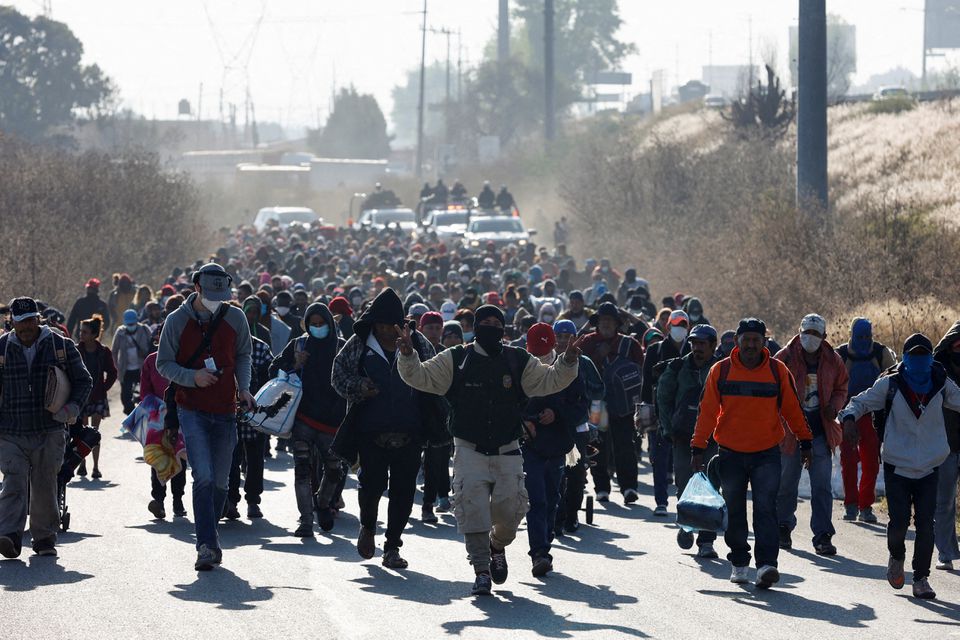by Raúl Romero

“Migrants, we are not criminals, we are international workers,” sang the more than 200 migrants that arrived after 7p.m. on December 14th at the facilities of the National Migration Institute (INM) in Polanco. The contingent arrived there to join the demonstration, called by collectives of Mexico City, in memory of the 56 individuals dead as a result of a trailer flipping in Chiapas. Accompanied by at least another 200 residents in solidarity and a batucada1, the group decided to move, raising alarm among the neighbors and workers of Polanco, toward the offices of the INM on the streets of Ejército Nacional. There candles were lit, floral offerings were made, and a roll call and a moment of silence were held for the dead. In their march, another slogan was continuously chanted: The borders are stained red, because that is where the working class is killed.
Mexico knows this international working class well. Over decades, millions of Mexican women and men have crossed the border to the United States in search of better jobs and incomes. More recently, thousands of individuals from this country have also decided to go to the US with or without papers, in the face of increasing violence. It is calculated that 36 million Mexican migrants currently reside in the neighboring country, that is 10 percent of the total population of that country. As was reported in these same pages (https://bit.ly/3mopqIJ), remittances from the Mexican migrants has become the principal source of foreign currency in 2021, above tourism, oil, agricultural exports and foreign investment included.
The migratory phenomenon is not unique to América. It is a global one that has been intensifying in recent decades. The process of neoliberal globalization that the reorganization of life and work implied at an international scale, made mass migration necessary for the production process. The international working class coming out of nations and regions left underdeveloped by plunder and dispossession, becomes cheap labor for the imperial centers; workers without rights or benefits, threatened with being denounced and expelled in the face of any complaint or protest. This is why the populations of the countries of Africa, the Middle East, Eastern Europe and Central and South America seek to arrive in countries like Germany, United States, Russia, Saudi Arabia, France, and the United Kingdom, to mention a few. These phenomena of massive displacements of the reserve army from the peripheries to the centers, and from the south to the north, also occur from the countryside to the city, since the megalópolis and development zones would seem to be the model of territorial reorganization driven by capital.
At the same time, some countries that expel migrants from Central and South America and also from Africa, have socio environmental devastation as a common denominator, as a result of the role that they impose on the system of production: the extraction of resources and the supply of raw materials. Similarly, they are characterized by their highly developed criminal economies, not only the drug market, but also the illegal extraction of minerals, illegal arms trafficking, human trafficking, etc.
We are here because you were there, read a banner in a demonstration of migrants in 2003, in Spain. The slogan sums up well the historical nature and the relationship between colonialism, imperialism, and the recent phenomena of mass migration.
From those sans papiers 2Sans Papiers is the French equivalent of “undocumented,” referring to migrants who do not have official status in the country.[?efn_note] in France, to the caravans of Central America, the international working class encounters obstacles that hinder its passage. From institutional racism and exacerbated nationalism that stems from xenophobia, the international working class throughout the world has to face the miliarization of the borders and repression, as well as the many violences of the multimillion dollar business of human trafficking.
Now that the government of Mexico has accepted reproducing the migration policies imposed by the most conservative sectors of the United States, even getting to the point of starting to demand a visa from people coming from Ecuador, Brazil and Venezuela, it is worth remembering our past and present as migrant peoples. Now that Mexico makes “the National Guard a kind of Border Patrol subordinate, internalizing the migration policies of the United States,” as Luís Hernández Navarro writes (https://bit.ly/33INTBX), it is necessary for our people and organizations to deploy all of their solidarity with the international working class and against imperialism.
This article was published in La Jornada on December 26, 2021. https://www.jornada.com.mx/2021/12/26/opinion/013a2pol English interpretation by Schools for Chiapas.
